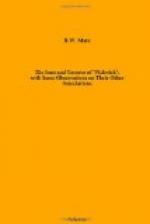Whilst taking his breakfast therein, Mr. Pickwick made the acquaintance of Mr. and Mrs. Dowler, also bound for Bath, who were to play such an unexpected part in his sojourn in the famous watering-place.
It was outside the “White Horse Cellar” that Sam Weller made that discovery about the use of Mr. Pickwick’s name which so annoyed him. Whilst the party were mounting the coach he observed that the proprietor’s name, written in bold letters on the coach, was no other than “Pickwick.” He drew his master’s attention to it, but Mr. Pickwick merely thought it a very extraordinary thing. Sam, on the other hand, was of the opinion that the “properiator” was playing some “imperence” with them. “Not content,” he said, “vith writin’ up Pickwick, they puts ‘Moses’ afore it, vich I call addin’ insult to injury, as the parrot said ven they not only took him from his native land, but made him talk the English langvidge arterwards.”
The “White Horse Cellar” ultimately was moved to the opposite side of Piccadilly, and in 1884, the new “White Horse” in turn was pulled down, upon whose site was erected the “Albemarle.”
The “White Horse Cellar” is also mentioned in Bleak House in the communication from Kenge and Carboys to Esther Summerson as her halting-place in London. Here she was met by their clerk, Mr. Guppy, who later, in his declaration of love to her, reminded her of his services on that occasion—“I think you must have seen that I was struck with those charms on the day when I waited at the whytorseller. I think you must have remarked that I could not forbear a tribute to those charms when I put up the steps of the ’ackney coach.”
CHAPTER XIII
FOUR BATH INNS AND THE “BUSH,” BRISTOL
On their arrival at Bath, Mr. Pickwick and his friends and Mr. Dowler and his wife “respectively retired to their private sitting-rooms at the White Hart Hotel, opposite the great Pump Room . . . where waiters, from their costume, might be mistaken for Westminster boys, only they destroyed the illusion by behaving themselves so much better.”
Mr. Pickwick had scarcely finished his breakfast next morning when Mr. Dowler brought in no less a person than his friend, Angelo Cyrus Bantam, Esquire, to introduce to him, and to administer his stock greeting, “Welcome to Ba-ath, sir. This is, indeed, an acquisition. Most welcome to Ba-ath, sir.”
For the story of the various adventures which overtook the Pickwickians in the famous city, what they saw, and what they did, the reader must be referred to the official chronicle, except where they are connected with some inn or tavern.
So far as the “White Hart” is concerned, there is little to be said in this direction. After the reception at the Assembly Rooms on the evening after their arrival, Mr. Pickwick accompanied his friends back to the “White Hart,” and “having soothed his feelings with something hot, went to bed, and to sleep, almost simultaneously.”




